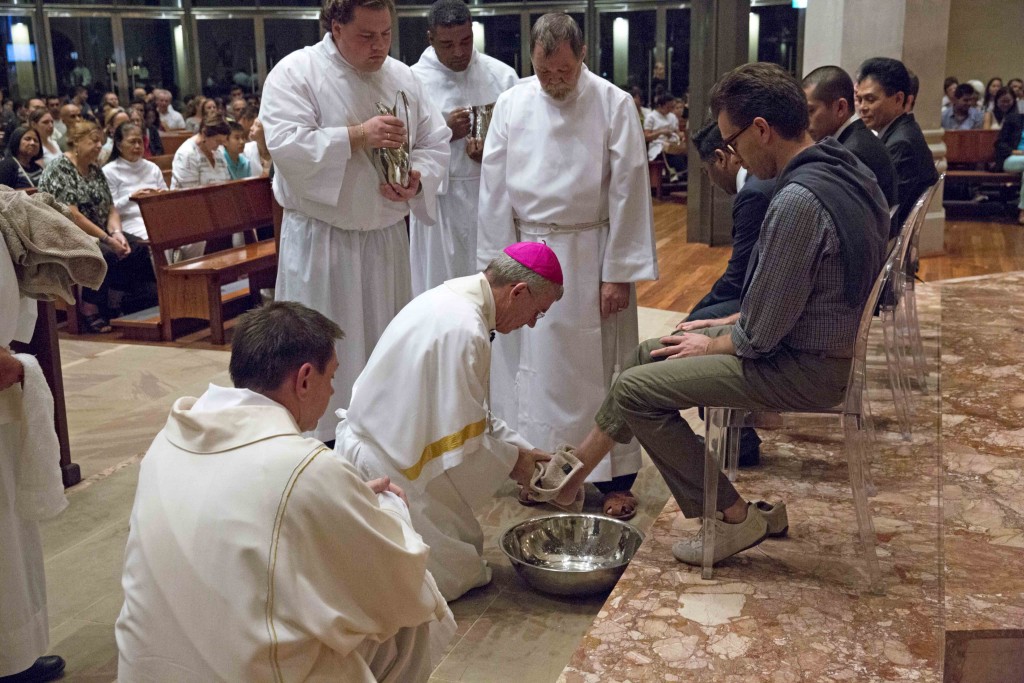
Archbishop Tim Costelloe said last weekend that our faith in Christ is not something that happens only in our heads, but is really an ongoing entrustment of ourselves to Christ’s love, compassion, mercy and unfailing presence in our lives.
The Archbishop made the comments during his homily on the Sunday after Easter, which marks the feast of Divine Mercy.
In his homily, the Archbishop spoke of three key words in the Gospel: “peace”, forgive” and “believe”.
“Our faith in Jesus, our belief in Him,” says the Archbishop, “is not something that happens only in our heads. It is not simply an intellectual thing.
“Our faith is really our ongoing entrustment of ourselves to His love, His compassion, His mercy and His unfailing presence in our lives. And it is this faith, this trust, which is the source of our peace.”
The Archbishop went on to say that “it is this trust which sustains us as we keep trying to commit ourselves to Him as the Way we should follow, the Truth we should believe in and the Life we should embrace”.
Pope Francis announces Extraordinary Jubilee Year of Mercy
Hours earlier, Pope Francis released a Bull of Indiction entitled Misericordiae Vultus, or The Face of Mercy, proclaiming a new Holy Year – the Extraordinary Jubilee of Mercy.
The Jubilee year officially opens on 8 December, commemorating both the Feast of the Immaculate Conception and the 50th anniversary of the closing of the Second Vatican Council.
The Holy Door of St Peter’s Basilica will be opened on this date and Holy Doors of the other papal basilicas will similarly be opened in the days which follow.
The Holy Father has requested that every diocese around the world open similar doors of mercy as a sign of communion with the Church and as a way for the Jubilee to be celebrated locally.
The Bull of Indiction was given to the archpriests of the four major Roman basilicas, where at each one there will be a Holy Door through which pilgrims can pass to receive special blessings.
In his homily for the feast day, the Pope posed the question as to why there is the need for a jubilee of mercy.
“Simply because the Church, in this time of great historical change, is called to offer more evident signs of God’s presence and closeness,” he responded.
“This is not the time to be distracted,” he said. “On the contrary, we need to be vigilant and to reawaken in ourselves the capacity to see what is essential.”
“This is a time,” the Pontiff said, “for the Church to rediscover the meaning of the mission entrusted to Her by the Lord on Easter Day, namely, ‘to be a sign and an instrument of the Father’s mercy’.”
This year, we are to be transformed by His mercy, so that we too may become “witnesses to mercy,” the Pope said, noting, “without the witness of pardon,” he lamented, “life would be unfruitful and sterile”.
The Holy Year’s motto is, Be merciful like your Father which, the Pope said, involves opening our hearts and witnessing mercy everywhere, for “pardon is a force that can give rise to new life and infuse courage to look with hope to the future”.
Fr Leonardo Sapienza, Regent of the Prefecture of the Pontifical Household, read the Bull in a ceremony by the Holy Door of St Peter’s Basilica.
With the Bull of Indiction – the formal document explaining why the Pope called the Jubilee, outlining his hopes for it, and giving an outline of what will happen during the Holy Year – Francis formally convoked the Jubilee. Afterward, the 78-year-old Pontiff moved into the basilica to preside over Vespers for Divine Mercy Sunday.
The closing date of the Jubilee Year of Mercy has been marked as 20 November, the solemn liturgical feast of Christ the King.
With Zenit and the Archdiocese of Perth.
Links
Pope’s Homily at Divine Mercy Vespers
www.zenit.org/en/articles/text-of-pope-s-homily-for-divine-mercy-vespers
Vatican-provided English Text of Bull on Indiction of Jubilee of Mercy
w2.vatican.va/content/francesco/en/apost_letters/documents/papa-francesco_bolla_20150411_misericordiae-vultus.html
A downloadable 12-page Word document containing the Bull of Indiction can be found at www.perthcatholic.org.au.